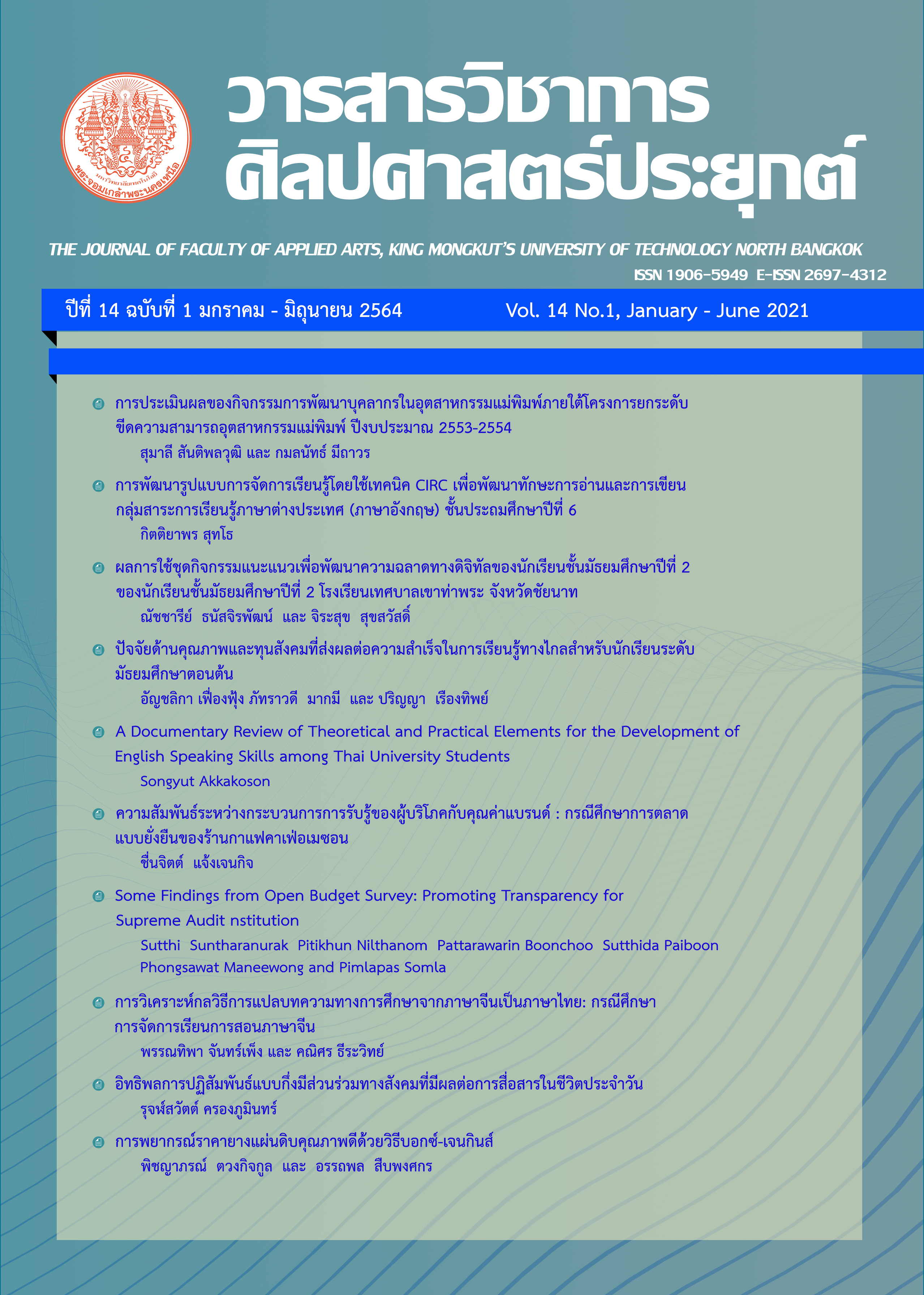การค้นพบบางอย่างจากการสำรวจการเปิดเผยงบประมาณ: การส่งเสริม การสร้างความโปร่งใสให้กับสังคมโดยองค์กรตรวจเงินแผ่นดิน
Main Article Content
บทคัดย่อ
องค์กรตรวจเงินแผ่นดิน หรือ สตง. เป็นองค์กรหลักที่มีบทบาทสำคัญในการสร้างความโปร่งใสให้กับสังคมผ่าน
การตรวจสอบภาครัฐ และการต่อต้านคอร์รัปชั่น บทความนี้มุ่งอภิปรายบทบาทของ สตง. และการส่งเสริมการสร้างความโปร่งใสให้กับสังคมผ่านการสร้างแบบจำลองทางเศรษฐมิติอย่างง่าย จากการศึกษาข้อมูลการสำรวจการเปิดเผยงบประมาณ (OBS) ขององค์การความร่วมมือทางด้านงบประมาณระหว่างประเทศ (IBP) พบว่า ประสิทธิภาพของ สตง. สามารถวัดได้จากระดับการเปิดเผยข้อมูลของ สตง. โดยหลักการเปิดเผยข้อมูลดังกล่าวสะท้อนถึงความโปร่งใสของ สตง. ขณะที่ดัชนีภาพลักษณ์คอร์รัปชั่น (CPI) ขององค์กรเพื่อความโปร่งใสนานาชาติ (TI) แสดงถึงระดับความโปร่งใสของประเทศ อีกทั้ง ผลการศึกษา พบว่า ระดับการเปิดเผยข้อมูลของ สตง. นั้นมีความสัมพันธ์กับดัชนีภาพลักษณ์คอร์รัปชั่น (CPI) โดยดัชนีภาพลักษณ์คอร์รัปชั่น (CPI) ส่งผลทางบวกต่อระดับการเปิดเผยข้อมูลของ สตง. นอกจากนี้ ระดับการเปิดเผยข้อมูลของ สตง. ก็มีความสัมพันธ์ทางบวกกับระดับความมีประสิทธิภาพในด้านการติดตามงบประมาณของรัฐสภา (LEG) และระดับการมีส่วนร่วมของภาคประชาชนในกระบวนการงบประมาณ (PP) ยิ่งไปกว่านั้น ผลการศึกษา ยังแสดงให้เห็นอีกว่า ระดับการเปิดเผยข้อมูลของ สตง. ส่งผลทางบวกกับ ดัชนีภาพลักษณ์คอร์รัปชั่น (CPI) ในลักษณะความสัมพันธ์แบบสมเหตุสมผล รวมทั้งยังสนับสนุนหลักการตามปฏิญญามอสโก 2562 ที่ว่า สตง. สามารถยกระดับคุณค่าของการตรวจเงินแผ่นดินโดยการทำหน้าที่ให้คำปรึกษาบนพื้นฐานของการตรวจสอบ ที่มุ่งเน้นประเด็นสำคัญเชิงยุทธศาสตร์ต่อรัฐสภา รัฐบาล และการบริหารจัดการภาครัฐ
Article Details

อนุญาตภายใต้เงื่อนไข Creative Commons Attribution-NonCommercial-NoDerivatives 4.0 International License.
1.บทความที่ตีพิมพ์เป็นลิขสิทธิ์ของวารสารวิชาการศิลปศาสตร์ประยุกต์ การนำเนื้อหา ข้อความหรือข้อคิดเห็น รูปภาพ ตาราง ของบทความไปจัดพิมพ์เผยแพร่ในรูปแบบ ต่าง ๆ เพื่อใช้ประโยชน์ในเชิงพาณิชย์ ต้องได้รับอนุญาตจากกองบรรณาธิการวารสารอย่างเป็นลายลักษณ์อักษร
2.ข้อความที่ปรากฏในบทความแต่ละเรื่อง เป็นความคิดเห็นส่วนตัวของผู้เขียนแต่ละท่านไม่เกี่ยวข้องกับวารสารวิชาการศิลปศาสตร์ประยุกต์ และบุคลากร คณาจารย์ท่านอื่น ๆ ในวารสารฯ แต่อย่างใด ความรับผิดชอบองค์ประกอบทั้งหมดของบทความแต่ละเรื่องเป็นของผู้เขียนแต่ละท่าน หากมีความผิดพลาดใด ๆ ผู้เขียนแต่ละท่านจะรับผิดชอบบทความของตนเองแต่ผู้เดียว
เอกสารอ้างอิง
Dye, K. M. & Stapenhurst, R. (1998). Pillars of Integrity: The Importance of Supreme Audit Institutions in Curbing Corruption. WBI working papers Washington, D.C.: World Bank Group. Retrieved from http://
documents.worldbank.org/curated/en/199721468739213038/Pillars-of-integrity-the-importance-of-Supreme-Audit-Institutions-in-curbing-corruption
EUROSAI. (n.d.). SAI’s competency includes the audit of the state (governmental) budget. Retrieved from https://www.eurosai.org/handle404?exporturi=/export/sites/eurosai/.content/documents/congress/
congressV/Subtema2-ing.pdf
Gustavson, M. & Sundström, A. (2016). Organizing the Audit Society Does Good Auditing Generate Less Public Sector Corruption? Journal Administration & Society, 50 (10), 1508-1532.
International Budget Partnership. (n.d. a). Open Budget Survey (OBS) 2019: Key Findings. Retrieved from https://www.internationalbudget.org/sites/default/files/2020-04/2019_Key_Findings_EN.pdf
International Budget Partnership. (n.d. b). Open Budget Survey 2019. Retrieved from https://www.internationalbudget.org/sites/default/files/2020-04/2019_Report_EN.pdf
INTOSAI. (n.d. a). INTOSAI-P 1: the Lima Declaration. Retrieved from https://www.issai.org/pronouncements/
intosai-p-1-the-lima-declaration
INTOSAI. (n.d. b). INTOSAI-P 20: Principles of Transparency and Accountability. Retrieved from https://www.
intosai.org/fileadmin/downloads/documents/open_access/INT_P_11_to_P_99/INTOSAI_P_20/INTOSAI_P_20_en.pdf
INTOSAI. (2019). XXIII INCOSAI 2019: Moscow Declaration. Retrieved from https://www.rechnungshof. gv.at/rh/home/news/EN_Moscow_Declaration_300919.pdf
Irawan, A. B. (2014). The Role of the Public Accounts Committee: An Indonesian Case Study. West East Journal of Social Sciences, 3 (3), 1-7.
Kim, S. (2015). Side by Side with People: Korea’s Experiences on Participatory Auditing. World Bank. Retrieved from http://documents1.worldbank.org/curated/en/995101557837621617/pdf/Citizen-Participatory-Audit-in-the-Philippines-Pilot-Phase-I-2012-2014.pdf
Mark, S. & Reiner, E. (2010). Auditor and Fiscal Policy: Empirical Evidence on a Little Big Institution. Journal of Comparative, 38 (4), 357-380.
National Assembly of the Republic of Slovenia. (n.d.). The Commission for Public Finance Control. Retrieved from https://www.dz-rs.si/wps/portal/en/Home/ODrzavnemZboru/KdoJeKdo/DelovnoTelo?idDT=
DT015
Parliament of Australia. (n.d.). Joint Committee of Public Accounts and Audit. Retrieved from https://www.
aph.gov.au/Parliamentary_Business/Committees/Joint/Completed_Inquiries/jcpaa/index
Reporters Without Borders. (n.d.). 2019 World Press Freedom Index. Retrieved from https://rsf.org/en/
ranking/2019
Tan, M. G. (2019). Citizen Participatory Audit in the Phillippines-Pilot Phase I (2012-2014). Washington. World Bank. Retrieved from http://documents1.worldbank.org/curated/en/995101557837621617/pdf/
Citizen-Participatory-Audit-in-the-Philippines-Pilot-Phase-I-2012-2014.pdf
Transparency International. (n.d.). Corruption Perceptions Index. Retrieved from https://www.transparency.
org/en/cpi
Transparency International. (2020). Corruption Perceptions Index 2019. Retrieved from https://www.
transparency.org/en/cpi/2019
UK Parliament. (n.d.). Public Accounts Committee. Retrieved from https://www.parliament.uk/business/
committees/committees-a-z/commons-select/public-accounts-committee/?utm_content=buffer399
d5&utm_medium=social&utm_source=twitter.com&utm_campaign=buffer
Wooldridge, J. M. (2013). Introductory Econometrics A Modern Approach (5th ed.). Cengage Learning India Private Limited, Delhi, India.


